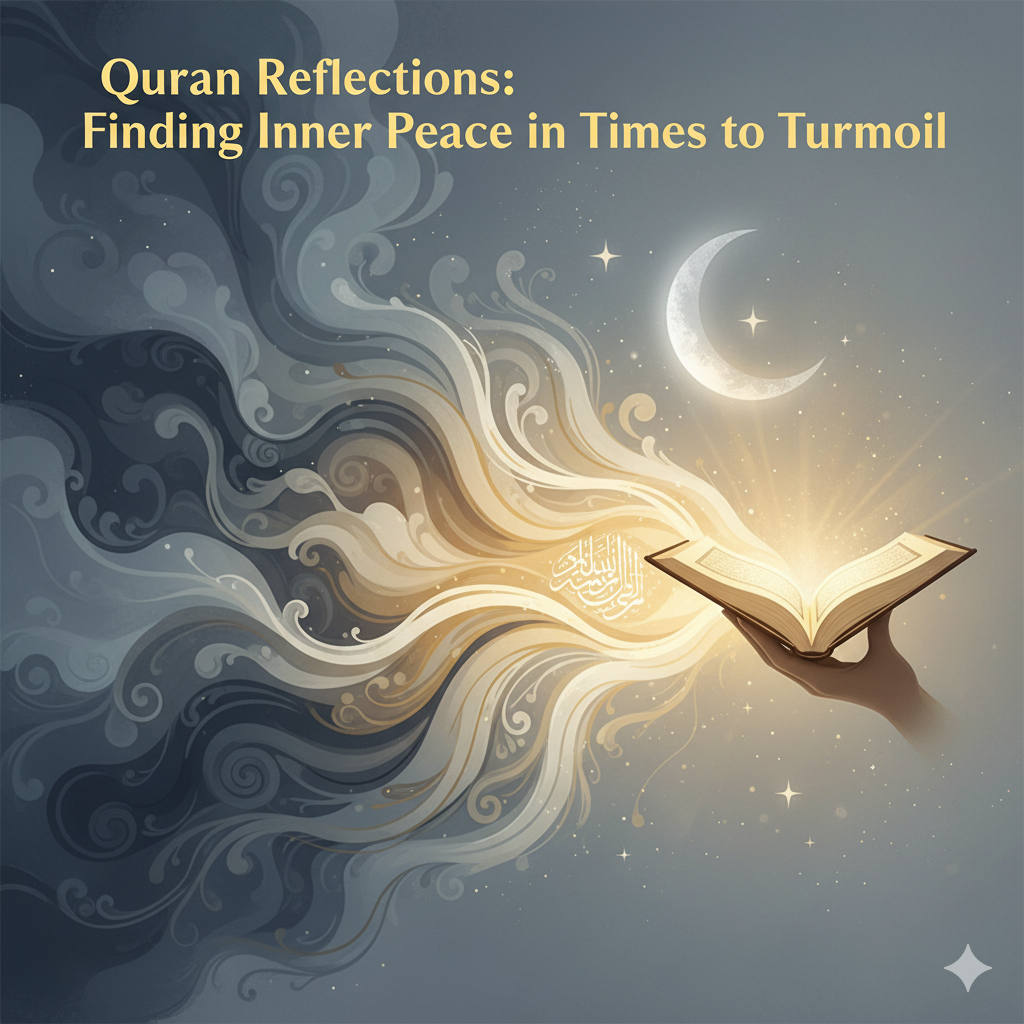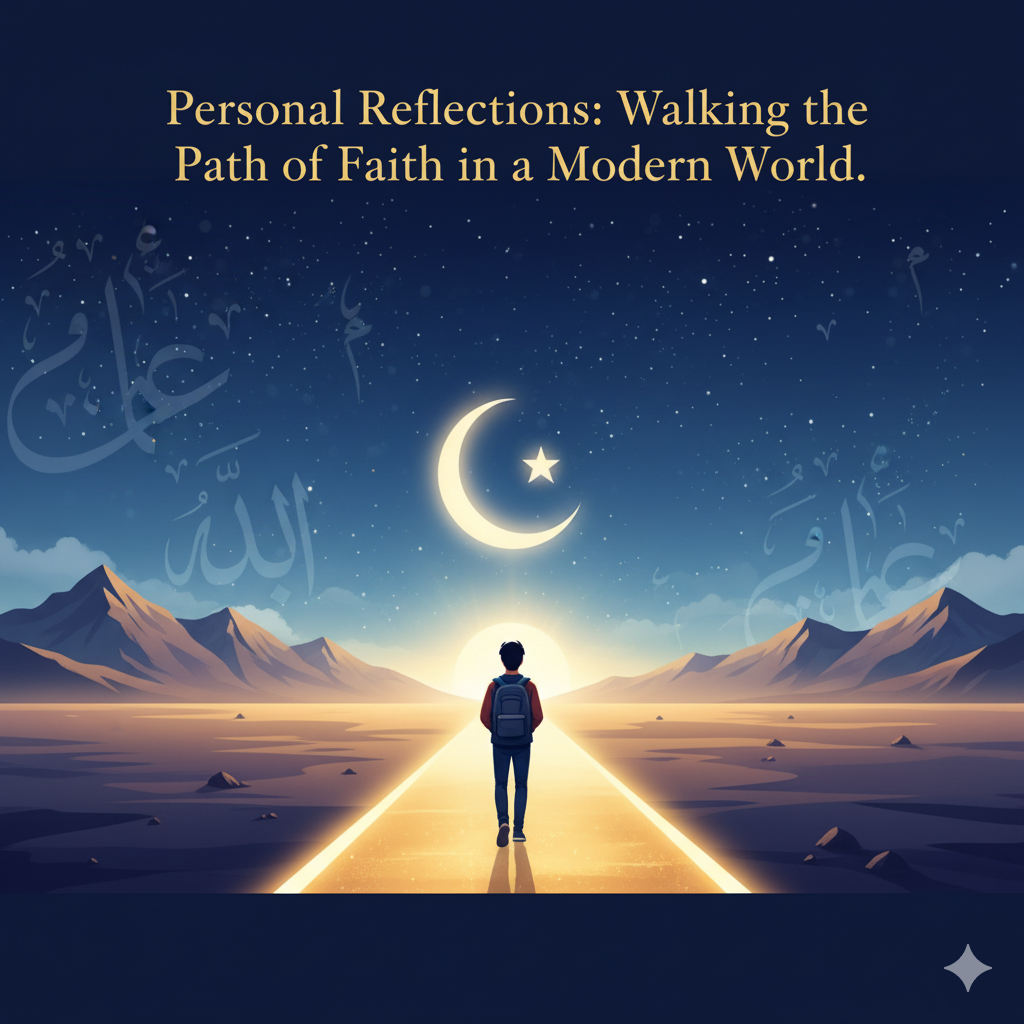1. The Restless Human Heart
The Prophet ﷺ described the human heart as something that constantly changes, saying:
“The heart takes its name from its constant changes (qalb). The example of the heart is like a feather at the root of a tree, being blown about by the wind.” (Ahmad)
In today’s world — with endless distractions, economic struggles, personal losses, and uncertainty — hearts are even more restless. But Allah reminds us of the ultimate key to tranquility:
Reflection transforms the Qur’an from words on a page into nourishment for this restless heart.
2. How the Qur’an Provides Peace
🌸 a) Remembrance of Allah (Dhikr)
Many verses encourage believers to remember Allah. Reflection deepens this remembrance by connecting His words to our personal situations. For example:
A believer who reflects here realizes: when I feel forgotten, Allah promises that He Himself remembers me. That thought alone brings calm.
🌙 b) Assurance of Divine Plan
Hardships often feel chaotic, but the Qur’an reminds us that every event is under Allah’s perfect control:
“Perhaps you dislike a thing, and Allah makes therein much good.” (4:19)
“Indeed, with hardship comes ease.” (94:6)
Reflection on these verses teaches that no pain is wasted; every difficulty carries hidden wisdom and relief.
🌿 c) Stories of Prophets in Trials
The Qur’an’s stories offer real-life examples of finding peace amid turmoil:
Prophet Musa (Moses, peace be upon him): Standing before the Red Sea with Pharaoh behind him, Musa declared: “Indeed, my Lord is with me; He will guide me.” (26:62). Reflection teaches trust in hopeless situations.
Prophet Ayyub (Job, peace be upon him): Despite illness and loss, he turned only to Allah, saying: “Indeed, adversity has touched me, and You are the Most Merciful of the merciful.” (21:83). Reflection here teaches patience and reliance.
Prophet Muhammad ﷺ: During Ta’if’s rejection, he raised his hands in dua, showing that peace lies in surrender to Allah’s mercy.
3. The Qur’an as Emotional Healing
🌸 Healing for Fear
Verses promising Allah’s protection calm fear:
🌙 Healing for Sadness
Verses about Allah’s nearness relieve grief:
🌿 Healing for Anxiety
Verses about trust (tawakkul) lift anxiety:
Reflection on such verses is like a spiritual therapy session, reminding believers that Allah’s words are living medicine.
4. Practical Methods to Reflect During Turmoil
Start with Dua: Ask Allah to open your heart: “O Allah, make the Qur’an the spring of my heart, the light of my chest, the remover of my sadness, and the reliever of my distress.” (Ahmad).
Choose Verses for Your Situation: Feeling scared? Reflect on verses about Allah’s protection. Feeling broken? Reflect on verses about His mercy.
Repeat and Internalize: Recite the verse slowly, close your eyes, and imagine Allah addressing you personally.
Write Reflections: Keep a Qur’an journal where you record what each verse means to your current state.
Live the Lesson: If a verse calls to patience, practice it that day. If it calls to gratitude, write down three blessings.
5. Reflection as a Daily Routine
Inner peace requires consistency. Set aside daily Qur’an reflection moments:
Morning: Begin with verses about Allah’s greatness (e.g., Surah Al-Fatiha or Ayat al-Kursi).
Afternoon: Reflect on verses about perseverance and justice.
Evening: Read verses about forgiveness before sleep to end the day with peace.
This rhythm turns the Qur’an into a steady companion through life’s storms.
6. Lessons from Verses of Peace
🌸 Surah Ar-Rahman (55)
Repeatedly asks: “So which of the favors of your Lord will you deny?” Reflection here awakens gratitude, which increases peace.
🌙 Surah Ash-Sharh (94)
“Indeed, with hardship comes ease.” This verse assures believers that no storm is permanent.
🌿 Surah Al-Ankabut (29:69)
“And those who strive for Us — We will surely guide them to Our ways.” Reflection inspires effort and trust in divine help.
7. The Ripple Effect of Inner Peace
When reflection brings peace to the heart, it spreads outward:
Families experience patience and kindness.
Communities reduce conflict and division.
The ummah becomes resilient in the face of global challenges.
A peaceful heart is not only a gift for the individual but a light for the entire society.
Conclusion
The Qur’an is not simply a book to read in ritual — it is the believer’s lifeline in times of turmoil. Reflection transforms verses into personal messages of comfort, strength, and hope. By engaging deeply with its words, we can turn storms into opportunities for growth, fear into reliance, and sorrow into patience.
Peace is not found in escaping hardship but in facing it with Allah’s words in the heart. Truly, the Qur’an is a reminder that no believer is ever alone — Allah is always near.
“This is the Book about which there is no doubt, a guidance for the God-conscious.” (2:2)
 English
English









